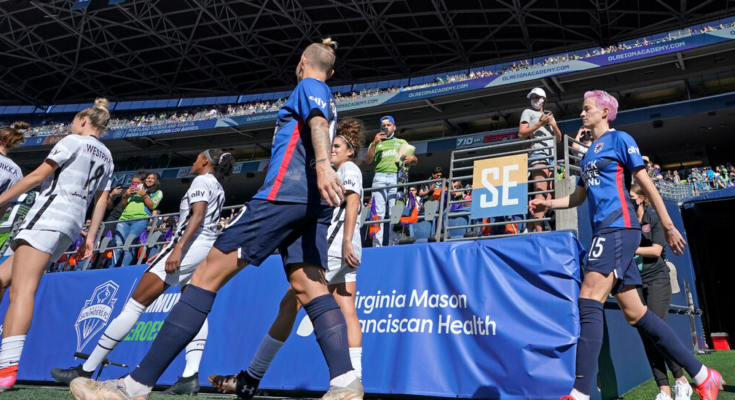When will we stop treating women in sports as second-class citizens?
That question needs pondering, once again, in light of the horrifying stories of male coaches accused of abusing and harassing players in the National Women’s Soccer League.
It turns out that the premier league for women’s soccer in the United States — where stars from the World Cup-winning national team like Megan Rapinoe and Alex Morgan play — treats the legions of less-renowned players like pawns in a male-controlled game of exploitation and moneymaking.
Rather than a celebration of female empowerment, revelations in recent days show the league as yet another example of the low regard society holds for female athletes. And in this case, it appears the athletes tolerated and suffered abuse because they feared complaining would doom the only U.S. league they have.
“Burn it all down,” Rapinoe said in a tweet.
She’s right.
This league needs an overhaul in leadership. The change has already begun with the resignation of its commissioner, Lisa Baird. And there is hope that a new generation of female athletes — coming up in this age of reckoning and bold energy among the marginalized, connected to one another and to the world by social media — will not remain quiet.
They are no longer afraid of the consequences, no longer shy about speaking truth to power.
They have as a North Star the many female gymnasts — including one of the most powerful stars in sports, Simone Biles — who have shown that coming forward and speaking up can bring about change. Doing so can even send perpetrators who once would have continued lurking in the shadows off to prison.
This was a turbulent, searingly painful week for women’s sports, but it also pointed the way to the future.
Women’s pro soccer players will not continue to accept the status quo.
No more tolerating coaches like Richie Burke, the former manager of the Washington Spirit, who unleashed a “torrent of threats, criticism and personal insults” on his players, according to The Washington Post.
No more condoning men like Christy Holly, the Racing Louisville coach, fired in August amid a swirl of accusations about the toxic environment he had fostered.
No more space for the likes of Farid Benstiti, former coach of the Seattle area’s OL Reign, who we now know was forced to leave after abusive comments.
In an investigation published this week by The Athletic, current and former players accused North Carolina Courage manager Paul Riley of emotionally abusing players and coercing them into sex. Though he denied the allegations, Riley was fired by the Courage.
The league’s players aren’t buying his denials. They are also disgusted with how the league was less than forthright about the behavior of these coaches. This weekend’s games were canceled when the players rose in unison, demanding reform.
“Men, protecting men, who are abusing women,” wrote Rapinoe, the biggest American star in women’s soccer and one of the league’s few household names. “I’ll say it again, men, protecting men, who are ABUSING WOMEN. Burn it all down.”
This statement needs some context. Baird, the N.W.S.L. commissioner, resigned on Friday after it became clear that she had done more to protect the men who run the league than the women who put it all on the line in competition.
Sometimes it’s not just men protecting men. Sometimes it’s power protecting power.
We all know who has the real clout — who stands at the top of the hierarchy. In the N.W.S.L., a vast majority of the team owners who own controlling stakes are men, as are a vast majority of the team executives and coaches.
As is true in the rest of society, the sports world rests firmly on a simple, troubling dynamic: Outside of a few exceptions, professional tennis being one, women in sports take a back seat to their male counterparts.
They receive far less media coverage, far less corporate backing, and far less love and respect from fans.
The W.N.B.A. playoffs are on, full of great story lines and stunning play. As my recent column showed, good luck finding a jersey from your favorite breakout star.
And good luck, as well, to the women’s teams who are crisscrossing the country on commercial airlines, scrambling to find flights where they do not have to cram their tired bodies into middle seats.
The players in major American men’s sports almost always fly on chartered jets. Female professionals almost never do.
The N.W.S.L. is far from a well-established league. Outside of a few cities, particularly Portland, Oregon, where Riley coached for years, its teams struggle for acceptance. The league’s nationally televised 2021 championship game is slated to take place in Portland on Nov. 20, and set to start at 9 a.m. local time. Before one of the biggest games of their lives, the players vying for the title will be waking up in the morning darkness and warming up on a cold field as the sun begins to rise.
It isn’t easy to make inroads in the public consciousness in a culture set up so completely to favor men.
Still, the N.W.S.L. has lasted longer and forged deeper roots than any American women’s professional soccer league ever has. The league is powerful because of what it represents: a future in which women are taken seriously and treated with full respect.
Female athletes are boldly standing up for that kind of transformative change. But this week proves that their battle to be treated equally is far from over. In many ways, it is just beginning.


